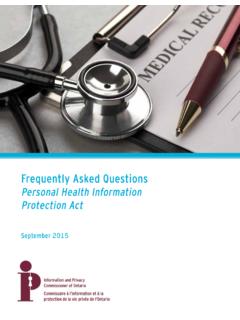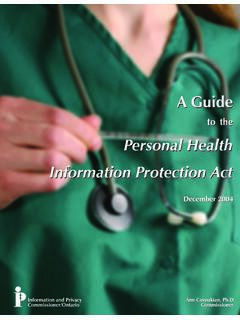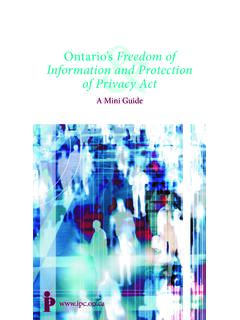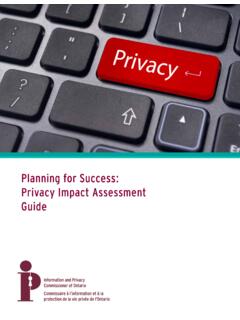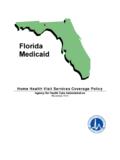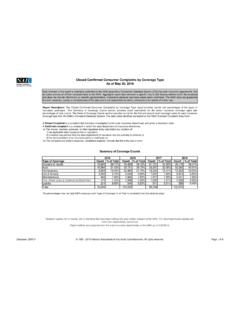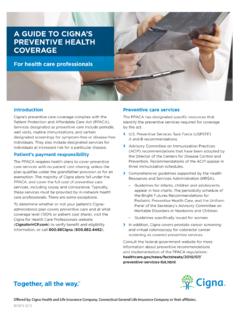Transcription of Sharing Personal Health Information for Health-Care …
1 Circle of care Sharing Personal Health Information for Health - care PurposesAugust 2015 The Information and Privacy Commissioner of Ontario, can-ada would like to thank the following organizations for their participation in this brochure:College of Physicians and Surgeons of OntarioOntario Association of Community care Access CentresOntario Association of Non-Profit Homes and Services for SeniorsOntario Hospital AssociationOntario Long Term care AssociationOntario Medical AssociationOntario Ministry of Health and Long-Term CareCONTENTSI ntroduction ..11. The Health Information custodian must fall within a category of Health Information custodians that are entitled to rely on assumed implied consent..32. The Personal Health Information to be collected, used or disclosed by the Health Information custodian must have been received from the individual, his or her substitute decision-maker or another Health Information custodian.
2 43. The Health Information custodian must have received the Personal Health Information that is being collected, used or disclosed for the purpose of providing or assisting in the provision of Health care to the individual..54. The purpose of the collection, use or disclosure of Personal Health Information by the Health Information custodian must be for the provision of Health care or assisting in the provision of Health care to the individual..75. In the context of disclosure, the disclosure of Personal Health Information by the Health Information custodian must be to another Health Information custodian..96. The Health Information custodian that receives the Personal Health Information must not be aware that the individual has expressly withheld or withdrawn his or her consent to the collection, use or disclosure..10 Limiting principles and options when consent cannot be assumed to be implied..11 CIRCLE OF care : Sharing Personal Health Information for Health - care PurposesCIRCLE OF care : Sharing Personal Health Information for Health - care Purposes 1 INTRODUCTIONThe term circle of care is not a defined term in the Personal Health Informa-tion Protection Act, 2004 (PHIPA).
3 It is a term commonly used to describe the ability of certain Health Information custodians to assume an individual s implied consent to collect, use or disclose Personal Health Information for the purpose of providing Health care , in circumstances defined in purpose of this brochure is to clarify the circumstances in which a Health Information custodian may assume implied consent and the options available to a Health Information custodian where consent cannot be assumed to be implied. Throughout the brochure, appropriate application of the assumed implied con-sent provisions of PHIPA will be illustrated using a variety of Health - care sce-narios involving a fictional 61-year-old gentleman named David Mann. It should be noted that the assumed implied consent provisions of PHIPA apply equally to paper-based and electronic records of Personal Health an appointment with his family physician, David Mann complains of memory loss, disorientation, speech problems and mood family physician examines David and asks him a series of questions relating to his medications, his Health history and the Health history of his family.
4 The family physician also conducts a mini-mental state examination and provides David with a requisition for blood and urine testing and for magnetic resonance imaging. The fam-ily physician indicates that she will refer David to both a neurologist and geriatrician for further When you may Assume Consent to be ImpliedA Health Information custodian may only assume an individual s implied consent to collect, use or disclose Personal Health Information if all of the following six (6) conditions are CIRCLE OF care : Sharing Personal Health Information for Health - care Purposes1. THE Health Information CUSTODIAN MUST FALL WITHIN A CATEGORY OF Health Information CUSTODIANS THAT ARE ENTITLED TO RELY ON ASSUMED IMPLIED Health Information custodians may rely on assumed implied consent to col-lect, use and disclose Personal Health Information for the purpose of providing Health care or assisting in the provision of Health care to an Health Information custodian is a person or organization described in PHIPA with custody or control of Personal Health Information as a result of, or in con-nection with, the performance of its powers, duties or work.
5 For example, Health Information custodians include: Health care practitioners long-term care homes community care access centres hospitals, including psychiatric facilities specimen collection centres, laboratories, independent Health facilities pharmacies ambulance services Ontario Agency for Health Protection and PromotionHowever, it is important to note that some Health Information custodians are not entitled to rely on assumed implied consent. For example, these include: an evaluator within the meaning of the Health care Consent Act, 1996 an assessor within the meaning of the Substitute Decisions Act, 1992 the Minister or Ministry of Health and Long-Term care the Minister or Ministry of Health Promotion the Canadian Blood Services CIRCLE OF care : Sharing Personal Health Information for Health - care Purposes 32. THE Personal Health Information TO BE COLLECTED, USED OR DISCLOSED BY THE Health Information CUSTODIAN MUST HAVE BEEN RECEIVED FROM THE INDIVIDUAL, HIS OR HER SUBSTITUTE DECISION-MAKER OR ANOTHER Health Information Personal Health Information to be collected, used or disclosed must have been received from the individual to whom the Personal Health Information relates, from his or her substitute decision-maker or from another Health informa-tion Health Information is defined in PHIPA as identifying Information relating to the physical or mental Health of an individual, the provision of Health care to an individual, the identification of the substitute decision-maker for the individual and the payments or eligibility of an individual for Health care or coverage for Health care .
6 Including the individual s Health substitute decision-maker is a person authorized under PHIPA to consent on behalf of an individual to the collection, use or disclosure of Personal Health Information . If the Personal Health Information to be collected, used or disclosed was received from a third party, other than the substitute decision-maker for the individual or another Health Information custodian, consent cannot be assumed to be implied. For example, a Health Information custodian may not rely on assumed implied consent if the Personal Health Information was received from an employer, insurer or educational s family physician provides the neurologist and geriatrician with a referral let-ter summarizing David s symptoms, Health history, and family Health history, along with the results of his examination. Can the family physician disclose and can the neurologist and geriatrician col-lect this Personal Health Information based on assumed implied consent?
7 Yes. The family physician, neurologist and geriatrician may assume implied consent. The family physician received the Personal Health Information directly from David and the neurologist and geriatrician received the Information directly from another Health Information custodian, the family physician, for the purpose of providing Health care to CIRCLE OF care : Sharing Personal Health Information for Health - care Purposes3. THE Health Information CUSTODIAN MUST HAVE RECEIVED THE Personal Health Information THAT IS BEING COLLECTED, USED OR DISCLOSED FOR THE purpose OF PROVIDING OR ASSISTING IN THE PROVISION OF Health care TO THE Personal Health Information to be collected, used or disclosed must have been received for the purpose of providing Health care or assisting in the pro-vision of Health care to the individual to whom it relates. A Health Information custodian may not rely on assumed implied consent if the Personal Health infor-mation was received for other purposes, such as research, fundraising, mar-keting or providing Health care or assisting in providing Health care to another individual or group of geriatrician to whom the referral is made is a co-investigator in a research study involving familial predisposition to Alzheimer s disease.
8 In the course of the research study, while reviewing the list of study participants, the geriatrician notices the name David Mann. The geriatrician reviews the research file of David Mann and deter-mines, based on a comparison with the Information contained in the referral letter, that it is the same David Mann. The geriatrician photocopies the records of Personal Health Information contained in the research file and places them in the clinical file for use at an appointment with David scheduled for November 13. Can the geriatrician use the Personal Health Information in this way based on assumed implied consent?No. The geriatrician may not assume implied consent because the Personal Health Information in the research file was not received for the purpose of providing Health care or assisting in the provision of Health care to David, but rather, for research purposes. CIRCLE OF care : Sharing Personal Health Information for Health - care Purposes 5 Following the appointment with David on November 13, the geriatrician would like to contact the laboratory for the results of the blood and urine testing ordered by David s family physician.
9 The geriatrician would also like to contact the pharmacy where David indicated he routinely fills his prescriptions in order to obtain a list of all current medications. Can the laboratory and pharmacy disclose and can the geriatrician collect this Personal Health Information based on assumed implied consent?Yes. The laboratory, pharmacy and geriatrician may assume implied consent. The Personal Health Information was received by the laboratory and pharmacy, and will be received by the geriatrician, for the purpose of providing Health care to CIRCLE OF care : Sharing Personal Health Information for Health - care Purposes4. THE purpose OF THE COLLECTION, USE OR DISCLOSURE OF Personal Health Information BY THE Health Information CUSTODIAN MUST BE FOR THE PROVISION OF Health care OR ASSISTING IN THE PROVISION OF Health care TO THE collection, use or disclosure must be for the purposes of providing Health care or assisting in the provision of Health care to the individual to whom the per-sonal Health Information relates.
10 A Health Information custodian may not rely on assumed implied consent if the collection, use or disclosure is for other purposes, such as research, fundraising, marketing or providing Health care or assisting in the provision of Health care to another individual or group of years pass and David s cognitive abilities continue to decline. Based on a diagnosis of probable Alzheimer s disease and the growing loss of David s functional abilities, David s geriatrician makes a referral to the local Community care Access Centre. For purposes of assessing David s eligibility and service levels, the care co-ordinator at the local Community care Access Centre contacts David s family physi-cian to obtain further Information about David s Health history, current medications and the Community care Access Centre collect and can the family physician disclose this Personal Health Information based on assumed implied consent? Yes. The Community care Access Centre is collecting this Personal Health informa-tion and the family physician is disclosing this Personal Health Information for the purpose of providing Health care or assisting in the provision of Health care to , the local Community care Access Centre facilitates the placement of David into a long-term care home.

